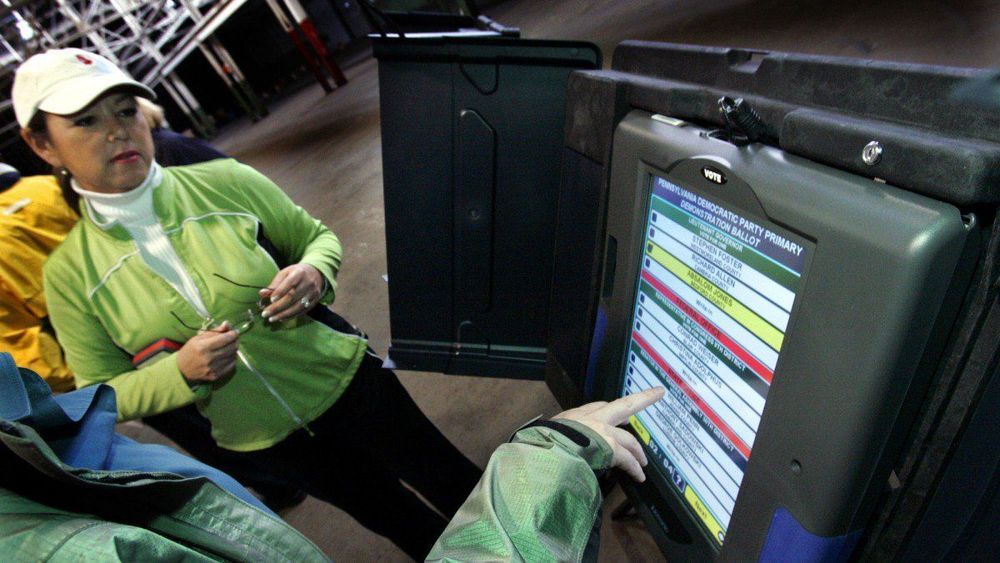Sea squirts use stem cells to regenerate their bodies from nothing but fragments of blood vessel, a finding that could help uncover the evolution of regeneration.



Low tech sometimes is really good because when systems can be exploited then basically you see that no tech is sometimes best.
Election Systems & Software has championed electronic voting machines in the US. Now it has had a change of heart about the need for paper records of votes.
Cyber threats: Over half a million electronic machines are used in big US elections. Many produce paper copies of votes that can be used to audit electronic results, but some don’t. That’s a problem because security experts have shown that machines can be hacked.
The news: Tom Burt, Election Systems & Software’s chief executive, said in an op-ed in the political newspaper Roll Call that it will no longer sell paperless voting machines as the primary voting device in jurisdictions. Burt also called on Congress to make paper backups mandatory for all electronic votes cast, and to require all voting equipment suppliers to submit their machines to robust cybersecurity testing.

A group of researchers at Sandia National Laboratories have developed a tool that can cross-train standard convolutional neural networks (CNN) to a spiking neural model that can be used on neuromorphic processors. The researchers claim that the conversion will enable deep learning applications to take advantage of the much better energy efficiency of neuromorphic hardware, which are designed to mimic the way the biological neurons work.
The tool, known as Whetstone, works by adjusting artificial neuron behavior during the training phase to only activate when it reaches an appropriate threshold. As a result, neuron activation become a binary choice – either it spikes or it doesn’t. By doing so, Whetstone converts an artificial neural network into a spiking neural network. The tool does this by using an incremental “sharpening process” (hence Whetstone) through each network layer until the activation becomes discrete.
According to Whetstone researcher Brad Aimone, this discrete activation greatly minimizes communication costs between the layers, and thus energy consumption, but with only minimal loss of accuracy. “We continue to be impressed that without dramatically changing what the networks look like, we can get very close to a standard neural net [in accuracy],” he says. “We’re usually within a percent or so on performance.”
Neuromorphic systems carry out robust and efficient neural computation using hardware implementations that operate in physical time. Typically they are event- or data-driven, they employ low-power, massively parallel hybrid analog/digital VLSI circuits, and they operate using the same physics of computation used by the nervous system. Although there are several forums for presenting research achievements in neuromorphic engineering, none are exclusively dedicated to this increasingly large research community. Either because they are dedicated to single disciplines, such as electrical engineering or computer science, or because they serve research communities which focus on analogous areas (such as biomedical engineering or computational neuroscience), but with fundamentally different goals and objectives. The mission of Neuromorphic Engineering is to provide a publication medium dedicated exclusively and specifically to this field. Topics covered by this publication include: Analog and hybrid analog/digital electronic circuits for implementing neural processes, such as conductances, neurons, synapses, plasticity mechanisms, photoreceptors, cochleae, etc. Neuromorphic circuits and systems for implementing real-time event-based neural processing architectures. Hardware models of neural and sensorimotor processing systems, such as selective attention systems, coordinate transformation systems, auditory and/or visual processing systems, sensory fusion systems, etc. Implementations of neural computational systems found in insects, birds, mammals, etc. Embedded neuromorphic systems, including actuated or robotic platforms which process sensory signals and interact with the environment using event-based sensors and circuits. To ensure high quality and state-of-the-art material, publications should demonstrate experimental results, using physical implementations of neuromorphic systems, and possibly show the links between the artificial system and the neural/biological one they model.




Time travel is complicated, which means it’s time for some charts.
I’m particularly fond of this one, created by fan Oren Bell. In an elaborate, detailed interactive timeline, Bell explores the various realities created by the actions of the Avengers in Avengers: Endgame, tracing the actions of each protagonist and their impact on the timeline(s). Simply click a character, and you can follow their journey, from the present to the past to the present again.

A mathematical equation has proven that controlling one of the two major changes in a cell—decay or cancerous growth—enhances the other, causing inevitable death.
In this video I show you an awesome laser lightsaber and then I talk about lightsabers and the possibility of using photonic molecules to build a real lightsaber. This thing is awesome! If the force is with us (and some quantum mechanics) we will some day have a true lightsaber…These are very dangerous lasers. NOT A TOY. Will cause instant blindness:
Blue Laser Pointer Lightsaber kit: https://goo.gl/9JUWdp
Lasers: https://goo.gl/adjvAi
Banggood: https://goo.gl/NyT1iK
Flash Deals: https://goo.gl/un1Ccr
App Downloads: https://goo.gl/4MPzAeWARNING: